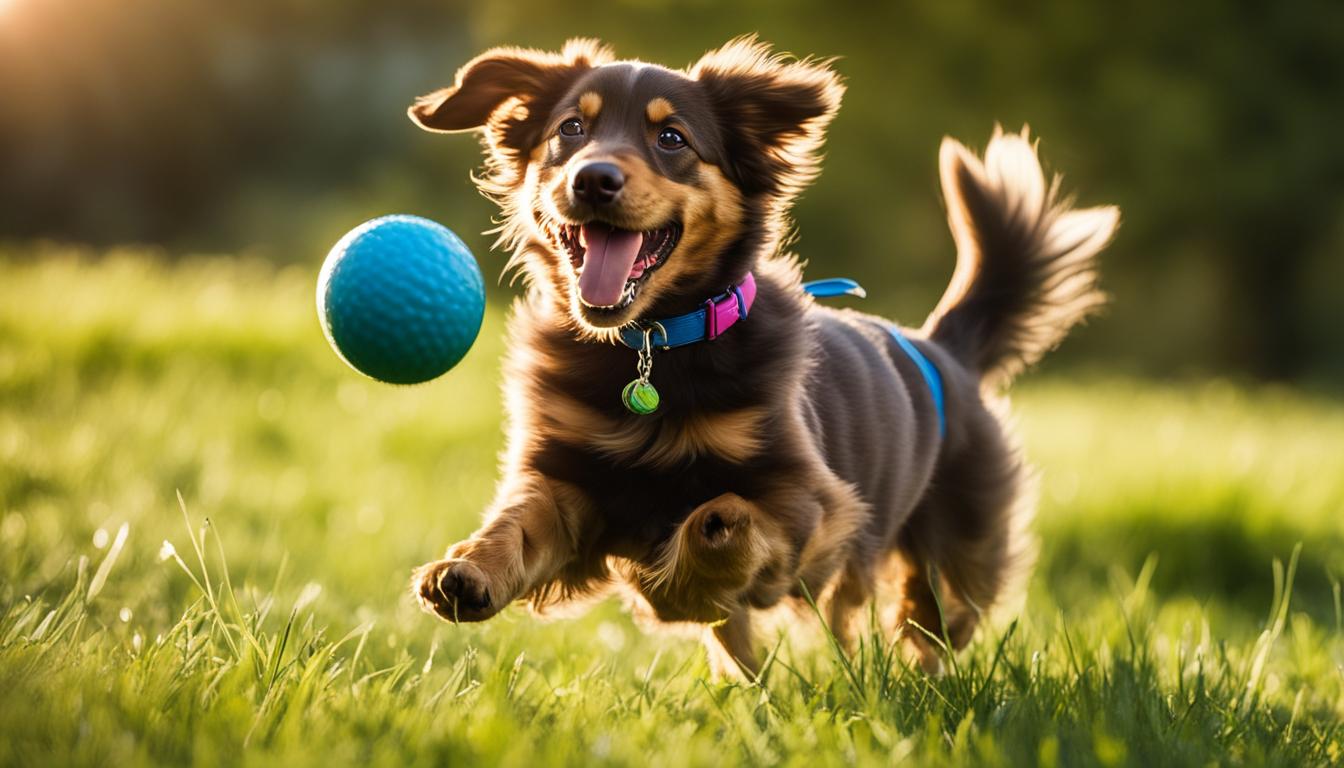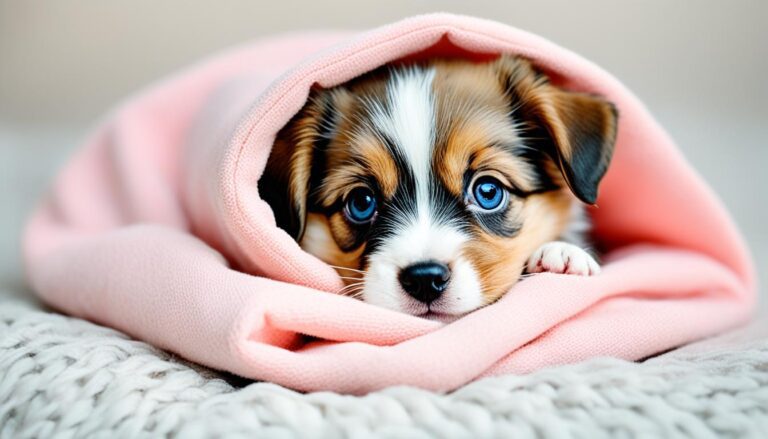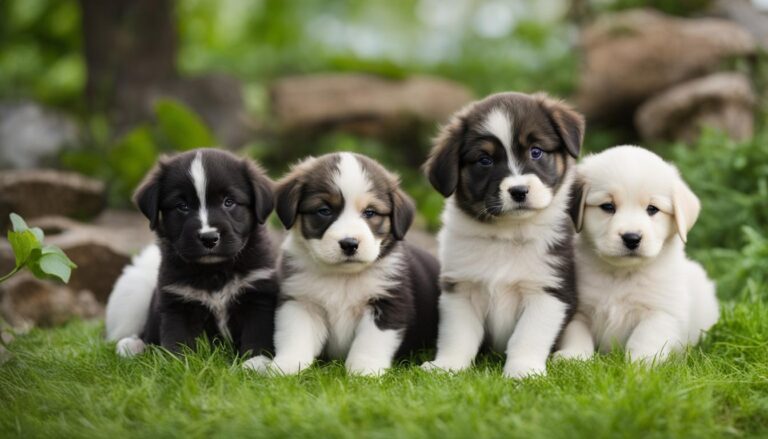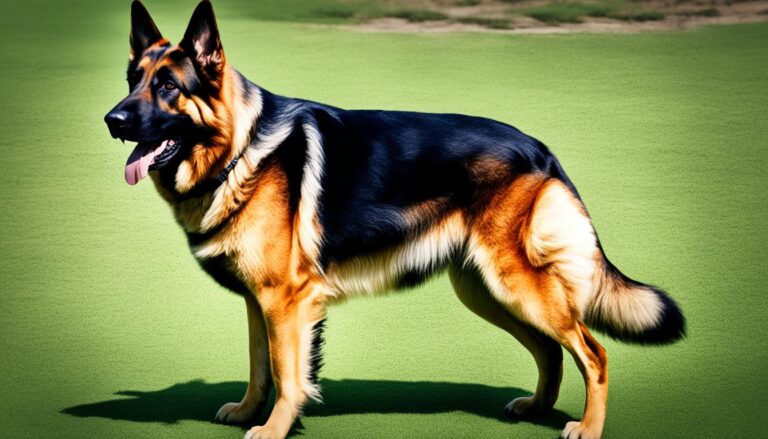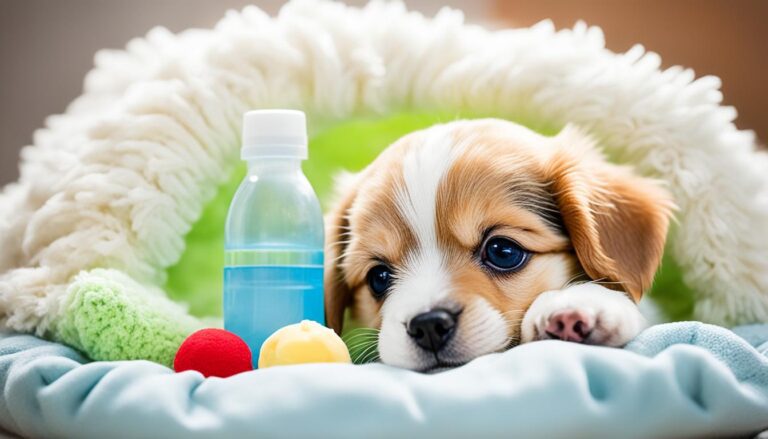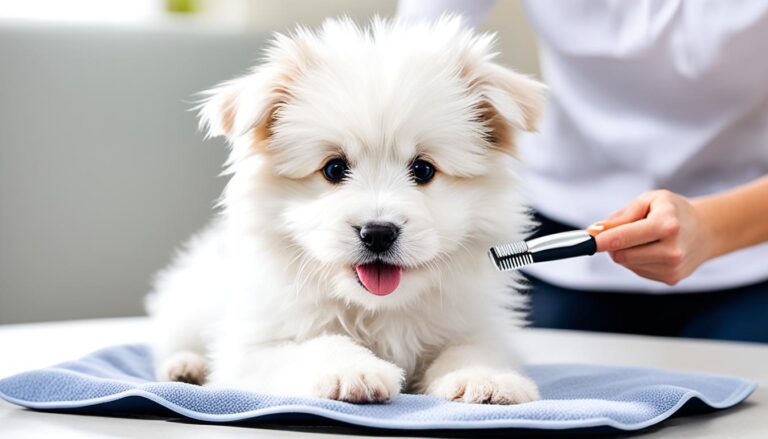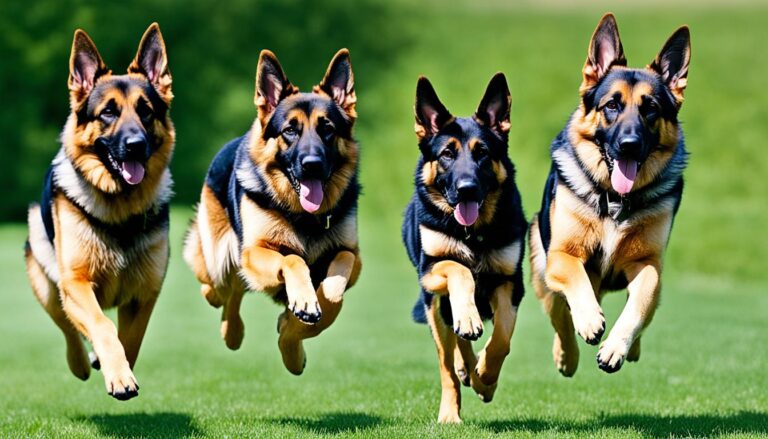Caring for Your Quite Playful Puppy: Tips & Tricks
Welcome to our guide on caring for your quite playful puppy! If you’ve recently brought home a lively and energetic bundle of joy, this article is here to help you navigate the exciting world of playful puppy care. Whether you’re considering getting an energetic puppy or already have one, it’s important to provide them with the proper care, attention, and training they need to thrive.
Playtime is a crucial part of your puppy’s development. Their playful nature is a reflection of their energy, love, and curiosity. Regular exercise sessions are essential to burn off excess energy and build a strong bond between you and your puppy. Whether it’s going for long walks, playing fetch, or visiting dog parks, make sure to allocate at least two 30-45 minute exercise sessions per day to keep your puppy active and satisfied.
It’s also important to establish boundaries during playtime and discourage rough behavior like nipping and jumping. Correcting bad behavior and understanding the commitment of owning a playful puppy are essential aspects of their care. By providing them with appropriate outlets for their playfulness, you can ensure a harmonious and fulfilling relationship with your furry friend.
Key Takeaways:
- Regular exercise sessions are important for playful puppies to burn off energy.
- Establishing boundaries during playtime helps discourage rough behavior.
- Correcting bad behavior and understanding the commitment of owning a playful puppy are crucial aspects of their care.
- Providing appropriate outlets for playfulness strengthens the bond between you and your puppy.
- Playtime is essential for the overall development and wellbeing of your puppy.
Training a Playful Puppy: Tips and Techniques
Training is an essential part of caring for a playful puppy. It not only helps in shaping their behavior but also strengthens the bond between you and your furry friend. Whether you’re starting with basic obedience commands or addressing specific behavioral issues, consistent training techniques can make a significant difference in your puppy’s development.
Establishing Basic Manners
To begin, focus on establishing basic manners and house-training your puppy. Consistency and positive reinforcement are key. Create a regular routine for meal times, potty breaks, and play sessions. Use specific words or phrases when teaching commands such as “sit,” “stay,” and “come.” Reward your puppy with treats and praise when they correctly follow these commands.
TIP: Use high-value treats, such as small bits of chicken or cheese, to motivate your puppy during training sessions.
Potty training may take time, so be patient. Take your puppy outside frequently, especially after meals or naps, and reward them when they eliminate in the appropriate area. If accidents happen indoors, refrain from punishment and simply clean up the mess without drawing attention to it.
Engaging and Interactive Toys
A playful puppy needs mental stimulation as much as physical exercise. Interactive toys and games can provide the mental challenges your puppy craves while also redirecting their attention from destructive behavior. Consider toys that require problem-solving skills, such as puzzle toys or treat-dispensing toys. These toys can keep your puppy entertained and mentally engaged for extended periods.
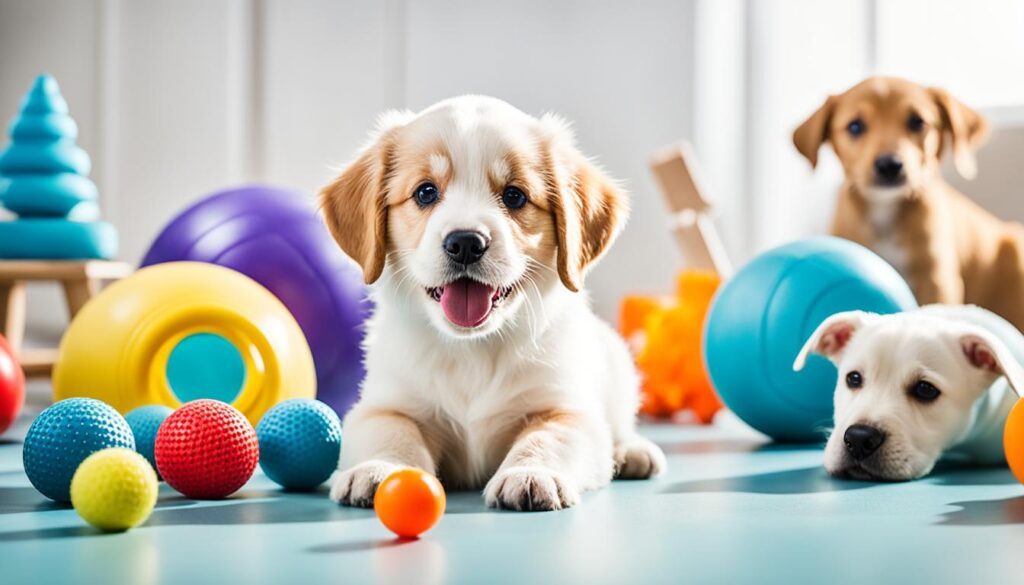
TIP: Rotate your puppy’s toys to keep them excited and prevent boredom. Introduce new toys regularly to maintain their interest.
Avoiding Problematic Behaviors
Playful puppies may exhibit certain behaviors, such as chewing or excessive barking, which can become problematic if not addressed early on. Teach your puppy appropriate outlets for these instincts. Provide a variety of chew toys to redirect their chewing behavior from household items and reinforce the idea of “chew toys are for chewing.”
Barking can be managed by teaching your puppy the “quiet” command. When your puppy starts barking excessively, calmly say “quiet” and redirect their attention to a toy or command that they are familiar with. Reward them when they stop barking and follow the new command.
Maintaining Short and Fun Training Sessions
Puppies have short attention spans, so it is important to keep training sessions brief and engaging. Aim for multiple short sessions throughout the day rather than one long session. This will prevent your puppy from becoming bored or overwhelmed.
During each session, focus on one command or behavior at a time. Use positive reinforcement techniques, such as treats and praise, to reward your puppy for their effort and progress. Remember to have patience and take breaks when needed.
| Tips for Training a Playful Puppy: |
|---|
| Establish a consistent routine for meals, potty breaks, and play sessions. |
| Use high-value treats as rewards for following commands. |
| Provide engaging and interactive toys to keep your puppy mentally stimulated. |
| Redirect chewing behavior to appropriate chew toys. |
| Teach the “quiet” command to manage excessive barking. |
| Maintain short and fun training sessions throughout the day. |
Preventing Boredom in Playful Puppies
Playful puppies are adorable and full of energy, but they can easily become bored, leading to destructive behaviors. As responsible pet owners, it’s essential to provide our furry friends with both physical exercise and mental stimulation to keep them engaged and happy.
Regular playtime and interactive games are crucial for preventing boredom in playful puppies. These activities not only provide physical exercise but also engage their minds, preventing them from getting into mischief around the house. Games like hide-and-seek, where you hide treats or toys for them to find, can stimulate their senses and keep them entertained for hours.
Another great way to prevent boredom is by using puzzle toys. These toys challenge your pup’s problem-solving skills and keep them mentally stimulated. Fill a puzzle toy with treats or kibble and watch as your pup tries to figure out how to retrieve the goodies. It’s a fun and rewarding game that can keep them occupied for extended periods.
Socialization is also an important aspect of preventing boredom in puppies. Introduce your furry friend to new places, people, and animals. This helps them develop confidence, keeps their curiosity alive, and prevents them from getting bored with their everyday routine.
Understanding your puppy’s breed instincts is vital for preventing boredom and problem behavior. Different breeds have different needs, so it’s important to provide suitable outlets for their natural instincts. For example, if you have a retriever, engaging them in games of fetch will fulfill their innate desire to chase and retrieve objects.
By incorporating playful puppy games, providing mental stimulation, and socializing your adorable and playful puppy, you can prevent boredom and ensure they lead happy and fulfilled lives. Remember, a well-stimulated puppy is a happy and well-behaved puppy!
Conclusion
Caring for a quite playful puppy is a rewarding but challenging endeavor. To raise a happy and well-behaved companion, it is crucial to meet their exercise needs, provide proper training, and ensure mental stimulation.
Regular exercise sessions are essential for a playful puppy’s physical and mental well-being. Taking your puppy for walks, playing fetch, and visiting dog parks are great ways to burn off their energy and strengthen the bond between you and your furry friend. Aim for at least two 30-45 minute exercise sessions a day to keep your puppy healthy and happy.
Playful puppy behavior can sometimes be mischievous, but with positive reinforcement training, you can guide them towards appropriate behavior. Rewarding good behavior with treats and using short and fun training sessions are effective methods of training your playful puppy. Additionally, interactive toys and games can provide mental stimulation and challenge their cognitive skills.
Preventing boredom is key to avoiding destructive behavior in playful puppies. Engage their minds and bodies with games like hide-and-seek, puzzle toys, and interactive play. Socializing your puppy and understanding their breed instincts will also help prevent boredom and foster a well-rounded pet. By providing a nurturing environment and meeting their needs, you can raise an energetic and lovable companion that brings joy to your home.
FAQ
How much exercise does a playful puppy need?
Playful puppies need at least two 30-45 minute exercise sessions a day to burn off energy and strengthen the bond with their owner.
What are some tips for training a playful puppy?
Training a playful puppy requires establishing basic manners, such as potty training and teaching them to be alone. Positive reinforcement methods and short, fun training sessions are recommended to keep your puppy engaged.
How can I prevent boredom in my playful puppy?
Preventing boredom in playful puppies involves providing both physical and mental stimulation. Regular playtime, interactive games, and puzzle toys can engage your puppy’s brain and prevent destructive behavior.
What are some ways to socialize a playful puppy?
Socializing your puppy involves introducing them to new places, people, and animals. This helps them develop good behavior and become comfortable in different situations.
Source Links
- https://www.dogtopia.com/blog/playful-puppy-facts-tips-puppys-exercise-routine/
- https://www.carefirstanimalhospital.com/news-events/our-playful-precocious-and-sometimes-persnickety-pups/
- https://www.akc.org/expert-advice/training/keep-your-puppy-active-and-out-of-trouble-with-stimulation-and-exercise/

